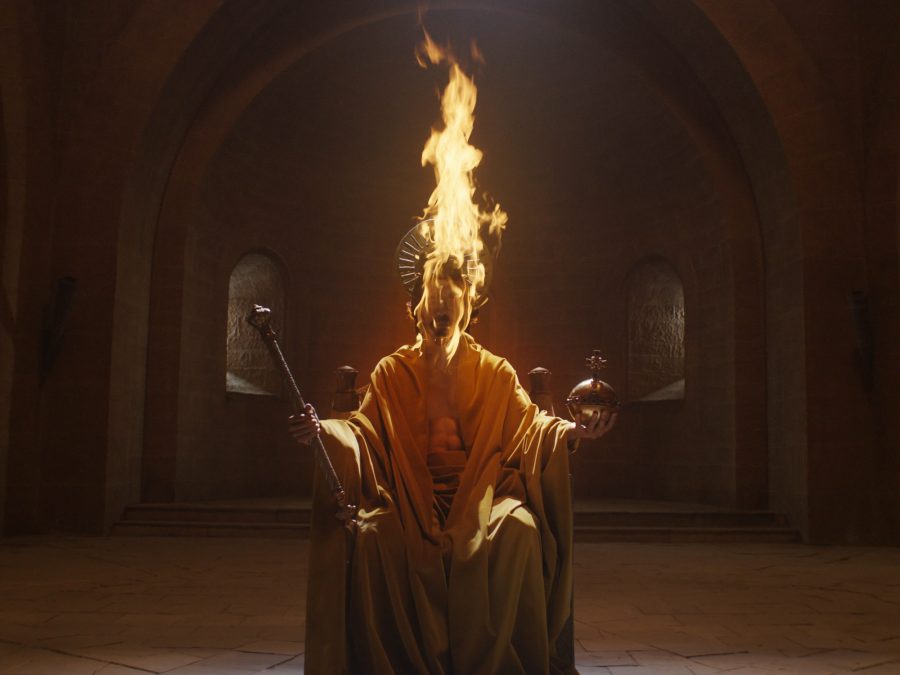There were few subjects as popular in Middle English literature as knights and beheading, which accounts for the enduring success of Sir Gawain and the Green Knight: a 14-century chivalric romance concerning the fortunes of King Arthur’s young nephew and the mysterious figure who challenges him to a friendly Yuletide game. Scholars have bickered over the myriad potential interpretations of the anonymous poem for centuries, and now comes a new cinematic interpretation from David Lowery.
It’s fitting source material for Lowery, whose strong body of work so far consists of stories that are – in one sense or another – concerned with myths and legends, all with a tinge of romance, from his strong debut Ain’t Them Bodies Saints to soulful Robert Redford swansong The Old Man & the Gun. Even his foray into Disney IP with the 2016 Pete’s Dragon remake was a tender, beautifully imaginative outing. This is a filmmaker who doesn’t do things by half.
The charismatic, laddish Garwain (Dev Patel) leads a charmed life in Camelot, drinking with friends and canoodling with his peasant lover Essel (Alicia Vikander). His mother, Morgan le Fay, gently scolds her son for his lack of airs and graces, but when a giant, otherworldly creature riding a horse imposes upon a Christmas feast hosted by King Arthur and Queen Guinevere (Sean Harris and Kate Dickie) it’s Gawain who steps up to the mantel and takes on his challenge: to land a blow upon The Green Knight, and in return, one year later travel to the Green Chapel and receive an equal blow in return.
The journey to seek his destiny becomes Gawain’s noble quest, taking him across the windswept British isles where he encounters all manner of friends and foes. Outside the bustle of Camelot, a wild land awaits the hapless young lord, and while his naivety once seemed sweet, in the world beyond the castle walls it’s a threat to his survival.
Yet for all the magic and mystery Gawain encounters along the way, he still lacks direction, waiting for an encounter – be it with the Green Knight or otherwise – to turn him into the chivalrous hero he believes he is destined to be. At Camelot folk ask when he’ll become a knight; Gawain takes the question in his stride but seems haunted by the suggestion that he may not be the man everyone around him tells him he is. As such, it’s a curiously contemporary story despite the medieval setting; one of expectations and restraints, the desire for freedom and the looming question of whether fate is decided for us or by us.
The film rests on Patel’s shoulders. There’s a puppyish quality to young Gawain which he captures with ease, but as life – and his perilous journey – take their toll, he becomes more sturdy and sure of himself. It’s a demanding role but Patel’s performance is effortless, beguiled by the majesty of the world beyond his gilded cage. He’s human enough to fail but knightly enough to not give in. Opposite Patel, Vikander does a diabolical Yorkshire accent as Essel, but as The Lady she makes for a bewitching co-star. As does Ralph Ineson, donning impressive prosthetics as The Green Knight himself. He is used sparingly and this adds to the character’s gravitas.
Visually the film is equally impressive. It’s rare to watch a film and feel so deeply the thought that has gone into every single frame – from the choice of fabrics that contrast the earthy greys and greens of the landscape to the intricate design of singles and crowns. Elsewhere, Lowery’s regular musical collaborator Daniel Hart provides another enchanting score, combining choral arias with evocative violin arrangements and unnerving calls which sound similar to whale song. It’s a strange and haunting soundtrack to a strange and haunting film.
While Lowery could have explored the poem in a little more detail (some of the nuance and queer subtext of The Green Knight’s identity are lost in this version) this is nonetheless a bold vision. Wild at heart, this quiet epic casts a lingering mystical spell, perfect to usher in the forthcoming autumn nights.

